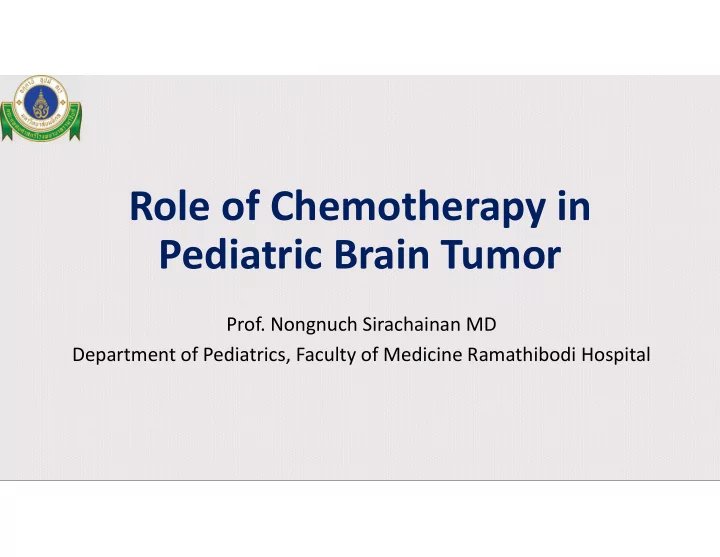

Role of Chemotherapy in Pediatric Brain Tumor Prof. Nongnuch Sirachainan MD Department of Pediatrics, Faculty of Medicine Ramathibodi Hospital
Outlines • Developmental treatment in brain tumor • Outcomes of Pediatric brain tumor: Past until present • Chemotherapy role in brain tumor • Supportive care in Pediatric brain tumor
Childhood CNS Tumor: How Important? • 2 nd most common 20 18 cancer in children 16 • 16.6% of all 14 12 malignancy in 10 children with 8 6 increasing trend 4 • Prevalence (2014) 2 0 2005 2006 2007 2008 2009 2010 2011 2012 2013 2014 13.2/100,000 0-4 5-9 10-14 15-19 • Male> Female Prevalence per million of CNS tumor reported by NHSO Wiangnon S et al Asian Pacific J Cancer Prev 2003;4:337-343
Type of Pediatric Cancer Childhood Cancer: Thai Cancer Registry Childhood Cancer: SEER Incidence Rates 2006-2010 Wiangnon S et al Asian Pacific J Cancer Prev 2003; 4: 337-343
Incidence of CNS Tumor According to the Type Astrocytoma Craniopharyngioma Japan Thailand Germany SEER Type of CNS tumor (%) (%) (%) (%) Astrocytoma 35.7 33.0 47 52 Germ cell tumor 14.3 17.7 2.5 1-2 Medulloblastoma Craniopharyngioma 10.5 ND 5.6 ND Medulloblastoma 10.0 16.3 21 28.7 (+PNET) Ependymoma 4.8 8.3 2.3 9 Germ Miller BA Cancer Causes Control 2008;19:227-56 cell Thai Pediatric Oncology Group 2003-2005
History of Brain tumor Treatment 1970 chemotherapy Chemotherapy role in brain tumor • Effectiveness: Medulloblastoma, PNET, intracranial germ cell tumor 1975-1980 radiation • Prolonged survival: High grade glioma 1980 gamma knife • Control tumor: Low grade glioma • Delayed radiation: Children < 3 years 1999 temozolomide 2005 genomic study 2008 targeted therapy (Bevacizumab)
Chemotherapeutic Agents Drug Route Tumor type Alkylating agent Melphalan IV, SCR High grade glioma Thiotepa IV, SCR High grade glioma CCNU, BCNU PO, IV High grade glioma, Oligodendroglioma Cisplatin IV Ependymoma Carboplatin IV Low grade glioma, Ependymoma High grade, low grade glioma, Procabazine PO Oligodendroglioma Temozolomide PO High grade glioma Antimetabolite Methotrexate PO, IV High grade glioma Plant alkaloids Vincristine IV High grade, low grade glioma Etoposide (VP16) IV, PO High grade, low grade glioma
Overall Survival of Thai Children with CNS Tumors >10 years 5-year OS 64.8% <1 year 5-year OS 46.6%
Treatment of Medulloblastoma: Chemotherapy Year Protocol 5-year OS 5-year OS Note (Standard risk) (High risk) 70.4% 1 47.6% 1 Overall 60.6% 1 1999- VCR, cyclophosphamide, 84.4% 2 42.8% 2 Overall 53.8% 2 2007 cisplatinum and oral etoposide 2008- Cyclophosphamide, 61.5% -Reduced ototoxicity 3 2013 carboplatin, vincristine and etoposide 2014 Cyclophosphamide, vincristine, -Increase total carboplatin and etoposide courses for high risk add vincristine during radiation -National protocol Sirachainan N et al J Clin Neurosci. 2011;18:515-9 Nalita N et al J Pediatr Neurosci. 2018; 13: 150–157 Sirachainan N et al J Clin Neurosci. 2018;56:139-142
Treatment of Germ Cell Tumor: Chemotherapy Year Protocol Note Overall 83% 2 2006 RT alone 20Gy Overall 81.6% 3 2003 RT 36 Gy whole brain local 54 Gy Overall 83% 4 2012 RT was adjusted according to metastasis 1999- cisplatin 30 mg/m 2 /day D 1–5, etoposide Overall 96.8% 1 100 mg/m 2 /day D 1–5 bleomycin 15 2006 (CSI 21–24 Gy for units/m 2 /day D 2 germinoma and 30–36 2006- Germinoma: Gy for NGGCT ) carboplatin 560 mg/m 2 /day D 1 2018 etoposide 150 mg/m 2 /D 1–3 NGGCT: carboplatin 560 mg/m 2 /day D 1 etoposide 150 mg/m 2 /day D 1–3 ifosfamide 1,800 mg/m 2 /day D 1–3 1 Worawongsakul R et al Unpublished data 2 Chitapanarux I et al Med Assoc Thai 2006; 89: 415-21 3 Shotelersuk K J Med Assoc Thai 2003; 86: 603-611 4 Raiyawa T et al J Med Assoc Thai 2012; 95: 1327-34
Treatment of High Grade Gliomas : Chemotherapy Year Protocol 5-year OS Carboplatin 560 mg/m 2 day 1 1999-2009 54.0% Irinotecan 125 mg/m 2 day 1 2010 Nimotuzumab 150 mg/m 2 /week 1, 3 Irinotecan 125 31.5% mg/m 2 week 1-3
Treatment Craniopharygioma: Intraommaya Chemotheray or Interferon Interferon 3 MU, 3 days/wk x 4 wk
Challenge in Treatment of Infant Brain Tumors Radiation Infant brain tumor protocol -Medulloblastoma -Choroid plexus carcinoma -Ependymoma -Atypical teratoid rhabdoid tumor SYMPTOMS
Neuropsychological Functioning of Survivor Ribi K et al Neuropediatrics 2005
Endocrine Problem in Medulloblastoma Survivors Normal 23% Growth Hypothyroid hormone 46% deficiency 8% Hypogonadism 23% Ramathibodi Hospital
Multi-disciplinary Approach • Physician • Radiologist • Nurse • Oncologist • Social worker • Surgeon • Pharmacologist • Etc………….. • Pathologist
Education and Family Support
Various Activities
Supporting Pediatric Cancer Survivors • Hospital’s School Liaison Program • Improved academic performance, home-school communication, and school-level understanding of unique student cognitive profiles and learning needs Northman L et al. J Pedistr Oncol Nurs. 2014 -Enhance cognitive function during treatment -Neuropsychometric evaluation post treatment
Summary • Prevalence of childhood CNS tumor is increasing • Multi-disciplinary team is required • Chemotherapy has a role in improving survival rate • Supportive care and long-term follow-up is mandatory for CNS tumor survivors
Acknowledgements • Data for Thai Pediatric Oncology Group and Ramathibodi Cancer Center • All Collaborative Institutes • All the multi-disciplinary team • International collaboration • All patients and families • Prof Suradej Hongeng • Kulvadee Surayuthpreecha
Thank You For Your Attention
Recommend
More recommend